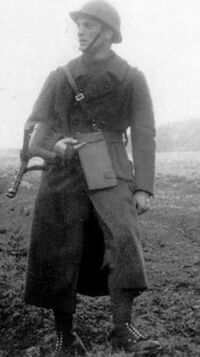Zdravko Merakovski
Zdravko Merakovski | |
|---|---|
 Merakovski in 1936 | |
| Nickname(s) | 'Grand Master' |
| Born | 5 November 1885 Sena, Syara |
| Died | 15 March 1970 (aged 84) Kona, Syara |
| Allegiance | |
| Service/ | Army of the Syaran Republic |
| Years of service | 1916-1941 |
| Rank | Field Marshal |
| Unit | Army Group Epsilon |
| Battles/wars | Divide War Siduri War |
| Awards | see below |
Zdravko Merakovski (5 November 1885 - 15 March 1970) was a Syaran Field Marshal who served in the Army of the Syaran Republic during the Siduri War. An ethnic Makedonian, Merakovski was born to a military family and was commissioned as an officer only a year before the outbreak of the Divide War. He was briefly a part of the Syaran intervention in the Ruvelkan Civil War before being transferred back to Syara to take part in the Desopya Campaign, where he served as an intelligence officer. In the inter-war years Merakovski steadily rose through the ranks and was promoted to Lt. General on the eve of the Ruvelkan invasion to command the Ninth Army. He drew up the outline for Army Group Alpha's invasion corridor, and distinguished himself during the campaign.
During the invasion of Quenmin he commanded the Ninth Army as part of the invasion of Tennai. Following the dismissal of Field Marshal Jirayr Bedrosian in 1935 Merakovski was given command of the newly formed Army Group Epsilon, responsible for operations in northern Quenmin. His most notable performance was during Operation Rhipsaspia where his "double counter-stroke" resulted in the near destruction of two Common Axis field armies. While an Army Group Commander he attempted to form independent armored formations to serve as a mobile operational grouping, which met with mixed success. Following the withdrawal of Allamunnika from the war, Merakovski withdrew his forces to southern Ruvelka to attempt a defense as part of Army Group Zeta. He retired from the military not long after the war ended and died in 1970.
Merakovski's performance as Army Group Commander was widely praised by his contemporaries and his performance during Operation Rhipsaspia is considered to be among Syara's most crushing military victories of the Siduri War. His recognition of the shortcomings of Syaran Measured Battle Doctrine and attempts to emulate Cacertian mobile armored formations made him one of the more progressive armored commanders in the Syaran Army, although he met with limited success in doing so. He was the second to last Syaran Field Marshal to pass away, beaten only by Kancho Stanimirov Pingov.